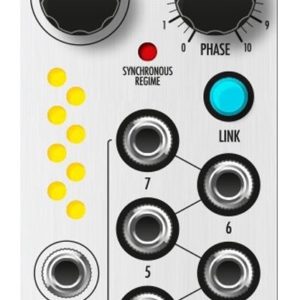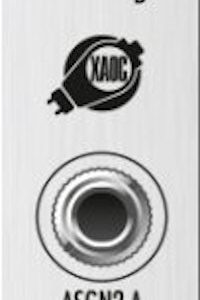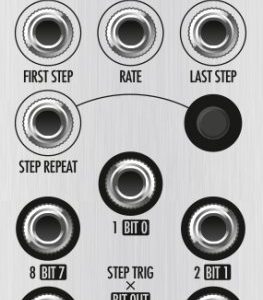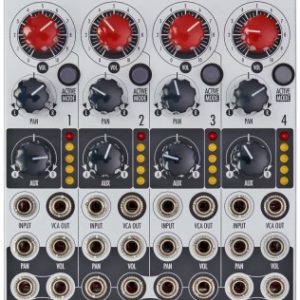ERFURT
£140.00
3 in stock
Description
BINARY PHASE AKKUMULATOR
MODEL OF 1989
Erfurt is a bi-directional digital counter, frequency divider, and a component of our 8-bit Leibniz Binary Subsystem. It has multiple applications: the output of the counter may be used as a phase source driving a digital wavetable, connected to other Leibniz modules it may scan waveshapes in Jena, produce stepped voltages useful for making interesting glissandi with Drezno and any VCO, generate gate patterns animating the spectrum of Odessa harmonic banks, spawn pseudo-chaotic sequences when fed back to Lipsk, etc.
It can also operate standalone (without other Leibniz components), and act as an 8-output clock and audio frequency divider.
Since Erfurt is based on CMOS logic (no CPU!), it can be clocked at very high frequencies (exceeding audio rate) without any aliasing or frequency interference. It also features its own internal HF clock source that may be used with clockless data sources.
For detailed description, please refer to the manual.
FEATURES
- Component of Leibniz Binary Subsystem
- Phase accumulator
- Programmable digital oscillator
- Bi-directional binary counter
- Clock and audio frequency divider
TECH SPECS
- 6hp, skiff friendly
- Current draw: +25mA/-30mA
- Reverse power protection
EXPANDABILITY
Drezno is the input/output front-end of the system, consisting of an analog–to–digital converter (ADC) and a digital–to–analog converter (DAC), that alone can be used for manipulating analog signals and voltages based on their binary representation.
Lipsk is a binary logic processing expander module that can flip (invert) individual bits of the digital signal representation. There are more Leibniz Binary Subsystem elements coming, with specialized and advanced sets of features.
Jena is a digital module that may be used as a flexible waveshaper for CV and audio signals, a wavetable oscillator, a Walsh function generator, or a rhythm generator.
Poczdam is a binary data routing solution for the Xaoc Leibniz Subsystem. It facilitates manual and remote switching between two Leibniz data sources.
DEMOS & TUTORIALS





